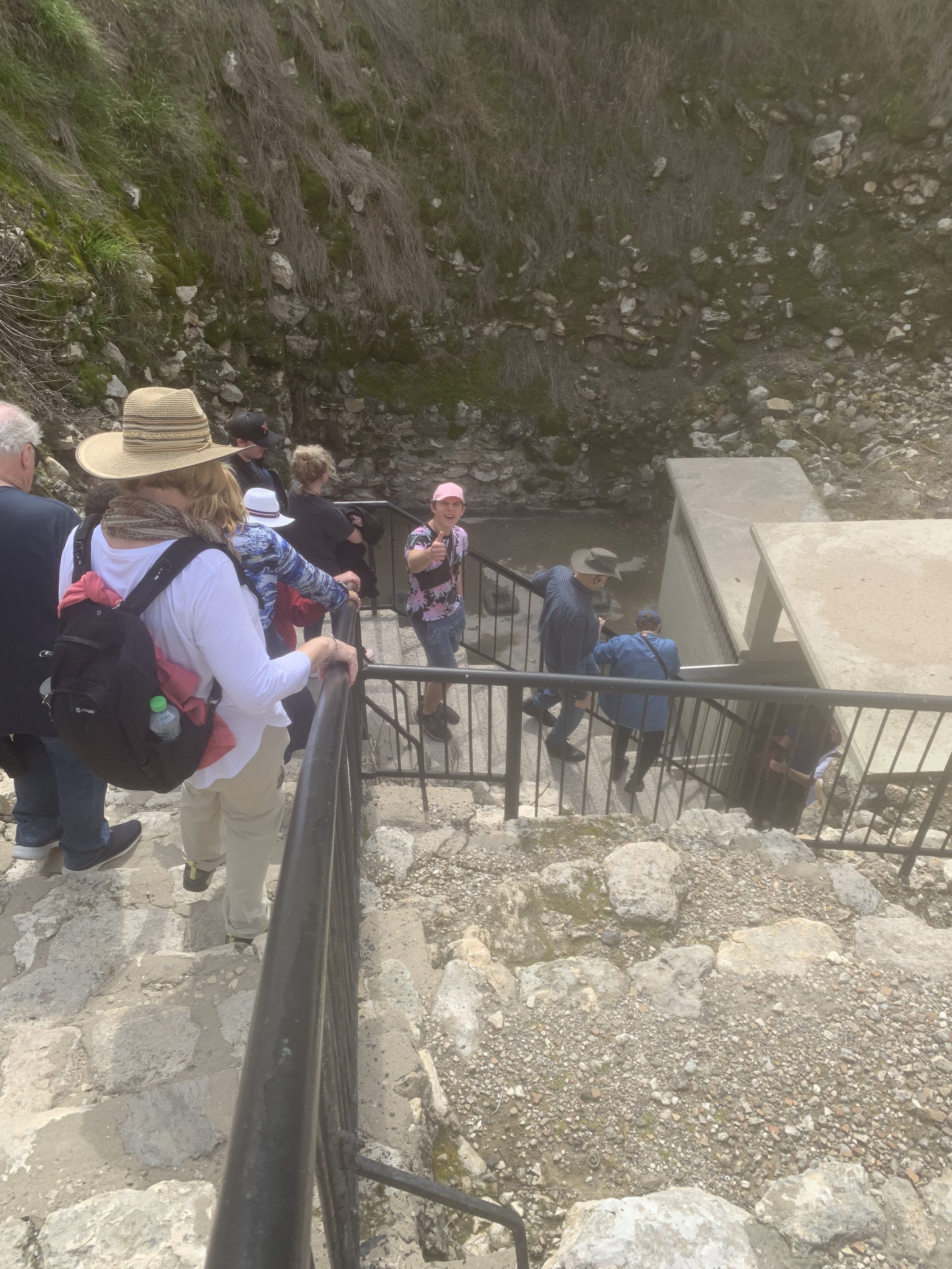Megiddo
Megiddo is the walled city close to the disputed gathering site of armies for Armageddon. The final battle will occur at the Mount Assembly, the Mount of Olives. (Those of you versed in scripture might find that interpretation interesting.) It was the crossroads of Egypt and Mesopotamia and built by King Solomon. We walked through the cistern here.
For Christians the word Megiddo is synonymous with the end of the world as mentioned in the Book of Revelation. Megiddo, or Armageddon, will be the site of the Final Battle. This will be the final battle of many fought here.
Walking down in to the cistern you learn so much about the history of life. The intricate details and brilliance behind the water system are absolutely outstanding.
Tel is a word meaning hill and it is signifies a hill that is built over the top of a civilization. Tel Megiddo is a 26 civilizations built one on top of another, on top of another, on top of another. The history is this Valley is so rich.
Megiddo and Tel Megiddo National Park
Megiddo was an ancient city known for its historical, geographical, and theological importance, especially under its Greek name Armageddon. This World Heritage Site became Tel Megiddo National Park. So for touristic and travel purposes, Megiddo and Tel Megiddo National Park are the same. Many refer to it as the City of Megiddo. Megiddo is not much more than the historical site. There is a restaurant there and they serve a delicious lunch.
There is more history this small little tel than anywhere in North America. That is difficult to wrap my head around. According to Revelation it also has more of a future.
Revelation 16:16
“Then they gathered the kings together to the place that in Hebrew is called Armageddon.”
While at Megiddo, I really thought about the eschatological views of all of those in our group. Many of us are Christians belonging to several different denominations and views. One key doctrinal difference we have is our view on the second coming.
As a librarian, I often get the question: “who is your favorite author?” To which I immediately reply C.S. Lewis. Not simply because of his writing style and his magic with words, but because he helped shape the Christian I am today. Our collective moral experience not just our collective religious experience is shaped by various components that surround us. Certainly, church is one of those. Your denominational affiliation I.E. Assemblies of God, Latter Day Saint, Roman Catholic, etc… is most certainly a contributor. Our beliefs are formed in a variety of ways with many outside forces playing a contributing role. For me, books are a major part in that shaping of my beliefs. Clearly, I cannot discount religion and church. I was at church every Sunday morning, Sunday night, Wednesday night and often the nights in between. I memorized scripture and could turn to any page in the hymnal and sing with my eyes closed and hands raised. I am not discounting that as a contributor. I am merely saying good or bad, books and what I read also play a huge role. The Chronicles of Narnia had a profound impact on me. “This was the very reason why you were brought to Narnia, that by knowing me here for a little, you may know me better there.” “The Voyage of the Dawn Treader” (1952) Each of the books in The Chronicles of Narnia series contain Biblical allusions, however, The Last Battle is easily the most allegorical considering it is best described as Narnia’s Armageddon. The Last Battle is the Megiddo of the series. Put simply, this is the end of Narnia. I don’t think that’s a spoiler, the title is literally: The Last battle. We have allegorical representations of the Antichrist, the false prophet, the fate of non-believers, Heaven, the Final Judgment, the Second Coming and the End of the World, it is a lot. It’s a pretty hefty topic for a children’s novel. There is death, violence and tragedy, so much so that with the new desire to ban books from shelves, I don’t want to speak too loud or this one will get added to the list. The story and style of the book is weightier than any previous book in the series. The Last Battle is the most spiritual, the most controversial, the most disheartening and ultimately the most upbeat book in the series. The Last Battle is CS Lewis’s Armageddon.
Revelation as a book is a hard swallow for me. There is a lot to take in. The Last Battle offers me some clarity, albeit allegorical.
A big way various Christians differ in their theology is their beliefs in the rapture, the second coming and last the great tribulation. I’m a HUGE CS Lewis fan. His writings have had a profound impact on my life and faith. His mind is a well-tuned machine that few could debate and win. Yes, I said few could debate and win. If you know anything about me, you would know that I love to debate. Sitting down with CS Lewis and debating scripture and theology would have been a dream come true. I will end my dialogue of Megiddo quoting him on his essay, entitled, “Predictions of the Second Coming.”
“Many people find it difficult to believe in this great event without trying to guess its date, or even without accepting as a certainty the date that any quack or hysteric offers them. To write a history of all these exploded predictions would need a book, and a sad, sordid, tragi-comical book it would be…Clearly no one wishes to say anything that will awaken such mass hysteria. We must never speak to simple, excitable people about ‘the Day’ without emphasizing again and again the utter impossibility of prediction. We must try to show them that impossibility is an essential part of the doctrine. If you do not believe Our Lord’s words, why do you believe in His return at all? And if you do believe them must you not put away from, utterly and forever, any hope of dating that return? His teaching on the subject quite clearly consisted of three propositions: (1) That He will certainly return; (2) That we cannot possible find out when; (3) And that therefore we must always be ready for Him.”
“All their life in this world and all their adventures in Narnia had only been the cover and the title page: now at last they were beginning Chapter One of the Great Story which no one on earth has read: which goes on forever: in which every chapter is better than the one before.”
“The Last Battle” (1956)
I am not certain that this will be the site of the “actual” last battle, but I do know that someday we will begin Chapter One of the Great Story. I can’t wait to get to that book in which every chapter is better than the one before.






















